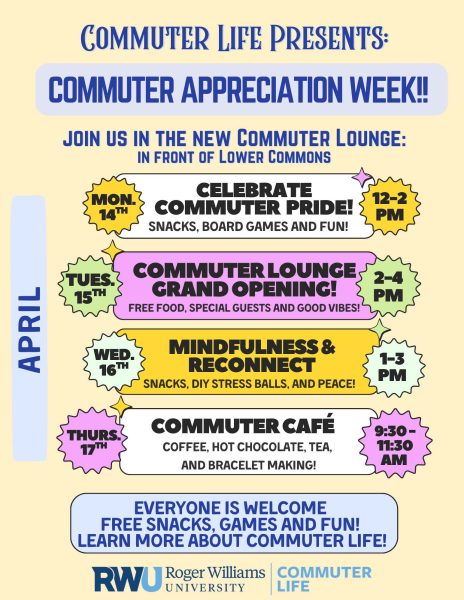Protest: A Teach-in
Faculty and staff of RWU lead a series of discussions surrounding various social justice issues called Protest: A Teach-In on Saturday, Sept. 22.
Each hour focused on a different topic, giving students and faculty the opportunity to drop in and out as they pleased.
The first hour was lead by Dr. Aaron Allen, an American studies professor. He presented “Our Survival is Non-Negotiable,” which spoke on student dissent and the San Francisco College Strike.
“Power is not static, it is not stable. It is malleable and can be changed,” said Dr. Allen when discussing the importance behind the San Francisco State College Strike. This five-month strike is considered the longest strike in U.S. history, and sought to expose the racism found on campus. People participating in the strike demanded increased student of color representation. As a result of their efforts, the Departments of Black Studies and Ethic Studies were founded at SF State, and many other higher education institutions followed their lead.
Dr. Allen went on to express that institutional change demands and adapts to disruption. Both the Black Student Union and the Third World Liberation Front presented San Francisco College with 15 demands. When their demands were not met, the students and staff of these organizations decided to strike.
This is similar to what Assistant Director of Queer and Trans Student Initiatives, Gabby Porcaro, expressed during her “‘Trans is Beautiful’ — Student Activism and the Push for a True Trans Tipping Point” presentation.
“[Our trans siblings] are some of the strongest, most resilient folks,” said Porcaro.
They were on the front lines during riots such as the Stonewall riots (1969), the Star House riot (1970) and A March of Our Own (2004).
Porcaro admitted to getting her inspiration for the presentation’s title from Laverne Cox, the first openly transgender woman to appear on the cover of Times Magazine, and the creator of the hashtag, #transisbeautiful.
Students then engaged in conversations about how they can make a difference, and help foster a more inclusive environment.
One student suggested encouraging staff to say their pronouns within their introductions, something Porcaro did at the beginning of her presentation.
“It may seem like such a small step, but we need to normalize it,” Porcaro said.
The same could be said by Dr. Jeremy Campbell, Dr. Jason Jacobs and Dr Laura D’Amore’s presentations.
During Dr. Campbells’ presentation, “Environmental Justice and Tribal Sovereignty in the North American ‘Sacrifice Zone,'” he explained that the American Sacrifice Zone refers to areas where things like weapon testing, military bases, drilling and a variety of other activities that damage the environment and lower the quality of life for the people around it take place.
Tribal Sovereignty is the right for recognized tribes to govern themselves in their communities on reservations. However, they can’t do anything about things that happen next to their borders, which raises the discussion of Native American rights.
In Dr. Jacob’s presentation, “‘Just drop my body on the steps of Congress’: AIDS and Political Mourning,” the idea of public and private body was brought up in reflection of the #MeToo movement, Anita Hill and cases such as, Roe v. Wade.
“Gay people never had the right to be public, to be open and out [before the stonewall era],” said Dr. Jacobs. “So after, when they started to fight for their rights, gay men focused on ‘claiming a right to be out and proud’ and had a ‘desire for [their] sexuality to be open and out.’”
Similarly, in Dr. D’Amore’s Presentation, “‘We’re Human and Being Treated as Less Than Such’: Exploitation, Title IX and the 1976 Yale Women’s Crew Team,” she discussed American women and their desires to break free of societal norms.
Women were tired of the controversies surrounding women in sports, as well as the discrimination and harassment they faced when they did decide to participate in sports.
Thus, Yale created Title IX, and later adapted it into what it is today in order to ensure that women were respected and treated equally in comparison to their male peers.
Much like the individuals and groups presented on during this event, diversity and inclusion are just some of the things RWU has been striving to include within their campus community.
Junior Jessica Silvia expressed why she believes it is important to have these discussions at Roger Williams.
“[These discussions] are so important to have because even though Roger Williams is working on becoming a more inclusive and diverse campus, there is still a lot of change that can be done,” said Silvia. “Having these talks and events can help engage students to participate in the changes necessary to better future [RWU] students.”
For those who may have missed the opportunity to attend, there will be a follow-up presentation where students will be taught how to protest, as well as experience a five hour civil disobedience training in the spring.




